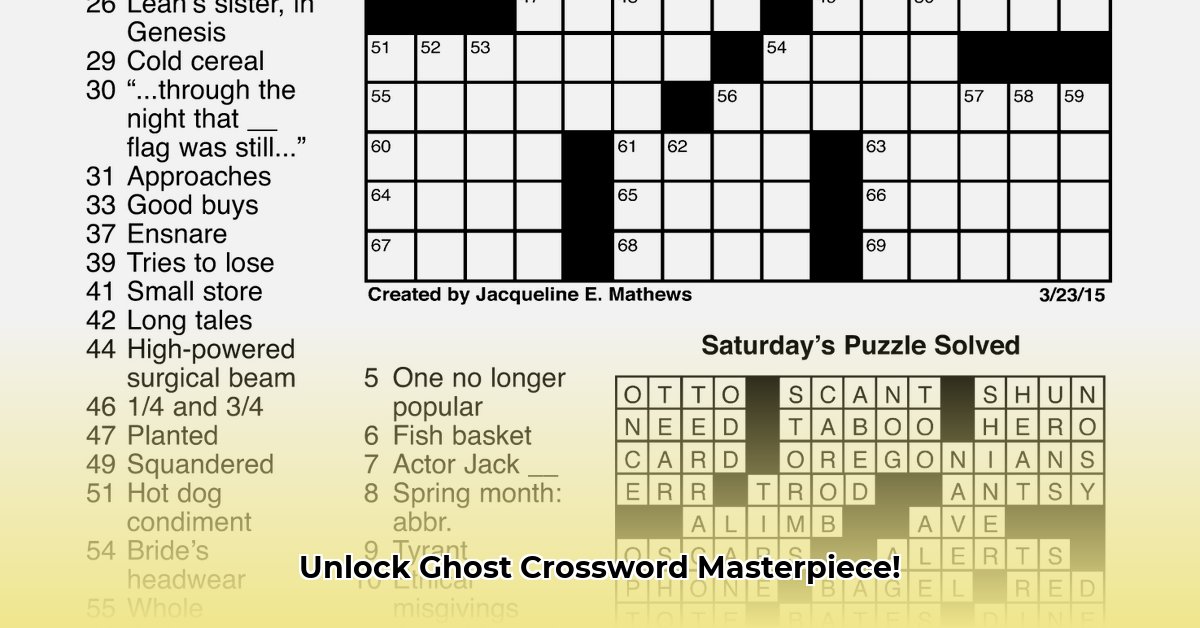Stumped by a “ghost” crossword clue? This expert guide equips you with the strategies and insights to unravel even the most perplexing puzzles. Learn to decipher hidden meanings, master cryptic techniques, and effectively utilize resources to elevate your crossword-solving skills. For even more tips, check out this helpful guide: Ghost Crossword Clues.
Deciphering “Ghost” Clues: A Comprehensive Guide
Crossword clues featuring “ghost” can be deceptively intricate, varying based on puzzle difficulty and required word length. A simple crossword might use a direct synonym, while a more challenging one demands creative thinking and specialized knowledge.
Simple Solutions: Short and Sweet
When “ghost” appears in a clue, immediate associations like “shade,” “specter,” and “spirit” often spring to mind. These concise options frequently appear in standard crosswords. “Phantom” may also fit, but precisely matching the number of squares is vital. Solving a crossword is like a detective matching a clue to a suspect.
Unlocking Longer Answers: When “Ghost” Gets Tricky
More challenging crosswords, particularly cryptic ones, might require answers like “apparition,” “wraith,” or “phantasm”. These extended answers often involve wordplay, double meanings, or other clever complexities. These clues demand intellectual agility, not just synonyms.
The Art of Cryptic Crosswords
Cryptic crosswords introduce an extra layer of complexity. Clues may contain cleverly disguised hints or puns. “Shade,” for instance, could be subtly hidden within a descriptive clue, such as “A pale shade of grey haunts the old house.” This emphasizes the need to look beyond the surface and identify the concealed word. Regular practice hones your ability to detect these ingenious word games.
Leveraging Online Crossword Solvers
Online solvers can be helpful, serving as tools rather than replacements for skill. Use them to verify word fit, confirm less common words, or explore potential solutions. Understanding why an answer is correct is the ultimate goal, improving your skills over time.
“Ghostly” Answers: A Detailed Overview
This table organizes common “ghost” crossword answers by letter count for quick reference:
| Letter Count | Possible Answers | Notes |
|---|---|---|
| 4 | SPOOK, SHADE, SOUL | Frequently found in easier puzzles. |
| 5 | GHOUL, DREAM, TRACE | Good options for slightly more challenging puzzles. |
| 6 | SPIRIT, WRAITH, SHADOW | Suitable for medium-difficulty crosswords. |
| 7 | SPECTRE, PHANTOM, EIDOLON | More challenging clues often use these. |
| 8 | REVENANT, PHANTASM | Often found in cryptic or difficult puzzles. |
| 9+ | APPARITION, POLTERGEIST, HALLUCINATION | Usually appear in the most complex and lengthy clues. |
Testing Your Knowledge: Practice Clues
Challenge your newly acquired knowledge with these clues:
- A mental representation of some haunting experience (5 letters)
- Move like a ghost (6 letters)
- The ethereal remnant of a past life (8 letters)
(Answers: SHADE, SHADOW, REVENANT)
Advanced Strategies for Crossword Mastery
Don’t just focus on the immediate clue. Examine the surrounding words in the crossword grid. Do intersecting clues offer hints, or do they limit possibilities for letters? Using surrounding words as contextual clues is highly effective. Consider multiple meanings and interpretations of the clue.
Consistent practice across varying crossword difficulties enhances pattern recognition and enables confident resolution of intricate “ghost” clues.
Mastering Crossword Answers: Ghost
Key Points:
- Cryptic crosswords depend on wordplay and precise definitions.
- “Ghost” clues rely on synonyms, hidden words, or homophones.
- Regular practice builds skills in detecting cryptic patterns.
- Online resources aid the solving process, but critical thinking remains key.
Decoding the Clue: Cracking the “Ghost”
Encountering a cryptic crossword clue with “ghost” as the solution? Deciphering these clues involves a puzzle within a puzzle, blending a direct definition of the answer with wordplay. Prioritize the wordplay, which points you toward “ghost.”
Consider it breaking a secret code. Clues may initially seem illogical, but examine beneath the surface. The phrasing is the clue-giver’s misdirection.
Common Cryptic Techniques for “Ghost”
Several techniques unlock a “ghost” solution. Let’s dissect these:
- Synonyms: Clues employ synonyms for “ghost,” like “specter” or “phantom.” Identifying the right synonym reveals a hidden code.
- Hidden Words: Answers are sometimes directly within the clue. A clue might read “a g_host in the_ machine,” literally embedding “ghost” inside the clue.
- Homophones: Clues utilize words with similar sounds but different spellings. Could “host” phonetically represent “ghost”? Consider all possibilities.
- Anagrams: Clues present scrambled letters that can be rearranged to form “ghost.” Look for signal words like “anagram” or “jumbled.”
Strategies for Success
Use this approach to improve your solution rate:
- Find the Definition: Locate the part of the clue that directly defines or hints at “ghost.” This is your primary reference.
- Analyze the Wordplay: Focus on the other parts of the clue. Search for patterns, synonyms, or anagrams.
- Combine the Elements: Put the definition and wordplay together. A complete picture of the clue mechanism emerges.
- Check Grammar and Fit: Ensure the answer fits the grid’s letter count and grammatical tense.
- Practice Regularly: Solving cryptic crosswords is like learning a language. Consistent effort improves skills.
Advanced Techniques and Resources
With experience, you’ll face complex clue types. Don’t be deterred. Persistent learning and attention to sophisticated cryptic techniques will expand your knowledge.
Ghost Crossword Clues: Advanced Techniques for Cryptic Puzzles
Let’s delve into those elusive “ghost” clues. The multifaceted word “ghost”—meaning a specter, a faint trace, or something forgotten—creates the ambiguity that constitutes a worthy crossword challenge.
Interpreting the Clue’s Multiple Layers
The power of “ghost” clues lies in its versatility, beyond literal phantoms. Consider the many ways we use this word in everyday language. To “ghost” someone means abruptly ending communication, while a “ghost town” signifies a deserted place. This richness unlocks a vast array of potential solutions.
Common Short Answers: Easy Wins
Often, the simplest solutions are the most concise. Classics like “spook,” “shade,” and “spirit” are ideal for fitting the crossword grid and are readily accessible to solvers.
Tackling Longer Answers: Thinking Outside the Box
If the clue suggests a longer word, a deeper understanding is required. Uncommon answers like “apparition” or “phantasm” need more inventive solving strategies. These extended answers enable a more creative approach.
Strategies for Cryptic Clues
Cryptic crosswords often employ wordplay. Synonyms and related words are important for long and short answers. Cryptic crosswords commonly play on words or phrases.
Using Web-Based Solvers Efficiently
Online resources can help generate ideas, but avoid relying on them too much. Use them to confirm your solutions, improve clue comprehension, and find unusual words. A blend of personal skills and available tools yields optimal results.
Practice Makes Perfect
Improve your skills with these practice clues:
- A faint trace (5 letters)
- Supernatural being (7 letters)
- Abruptly ended a relationship (5 letters)
Key Takeaways:
- “Ghost” clues cover literal and figurative meanings.
- Length significantly restricts answers, favoring shorter ones.
- Online solvers support skill development, not as crutches.
- Mastering wordplay means spotting puns and double meanings.
- Solve crosswords often to hone your abilities.
Mastering Elusive Ghost Crossword Answers: A Regional Approach
Key Takeaways:
- “Ghost” clues yield various answers, highlighting its varied nature.
- Common solutions are: PHANTOM, SPECTER, SPIRIT, GHOUL, and SPOOK, with length as a key factor.
- Online resources help identify potential solutions.
- Regional variations influence answer choices.
- Good Morning Images to Share with Loved Ones - January 10, 2026
- Handsome Good Morning Message for Him Long Distance to Make Him Smile - January 9, 2026
- Find the Perfect Good Morning Handsome Gif for Him - January 8, 2026










